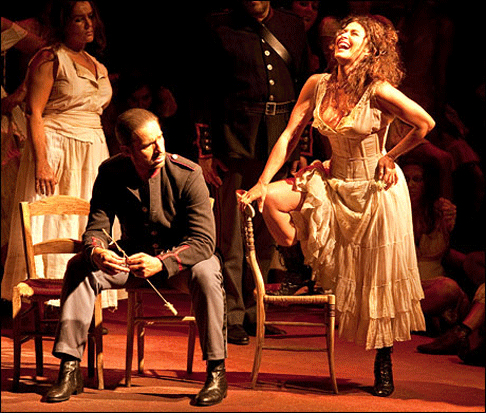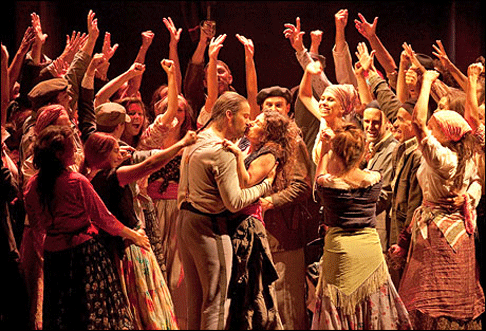At the OpÈra Comique in Paris, the theater where it was first performed, Bizet’s *Carmen* has triumphed again. One of the most performed operas around the world, it has recorded nearly 3000 performances alone at the Comique. But a new production with a fresh perspective has given the old girl new life. Hugh Canning, of the *Times of London*, declares “Carmen has never sounded more revolutionary, romantic or thrillingly vibrant.”
Conductor John Eliot Gardiner brings along his polished Orchestre RÈvolutionnaire et Romantique to play on instruments which recreate the lost sound of the 19th Century orchestra. His Monteverdi Choir, with a discipline and artistic commitment not found in Parisian opera choruses, also showed a real sense of the theater. Stage director Adrian Noble, a former head of the Royal Shakespeare Theater, created an intense, elegant, clichÈ-free staging that tells the story with an engaging freshness. There has seldom been a director so committed to the details of this fatal confrontation and who could work with such talented singing actors. The single set easily becomes taverns and bullrings thanks to the lighting of Jean Kalman, who is, quite simply, the best in the business.
The fact that this opera is being performed in a theater with only 1255 seats certainly contributed to the more intimate reading. Most American audiences, for example, see this opera in theaters two or three times the size of the Comique. *Carmen*, usually a season filler, is a vehicle for stars to strut and orchestras, twice the size that would fit in the Comique pit, to swell and soar. Gardiner, however, conducts with a clarity and sure impulse that strips away the accumulated years of bombast. Among other details, the First Act duet between Don JosÈ and MicaÍla finished with a quiet intensity and not with the shouting match one usually hears. He also restored several sections which are routinely cut, including a profoundly disturbing, almost Wagnerian bit of music when Carmen learns that the cards predict death.
The grand Italian soprano Anna Caterina Antonacci was in top form for this role. She has already recorded it at the Royal Opera in London on DVD but this effort is a different, more subtle reading, more in tune with Gardiner’s adherence to the storytelling art of Adrian Noble. As Don JosÈ, the talented American tenor Andrew Richards, fully recovered from an indisposition which caused him to miss an earlier performance, was able to give 100% for the performance on June 25, broadcast live to fifty theaters in France and Switzerland. That night was also recorded for later television broadcast and thus become a candidate for a DVD release. The gifted soprano Anne-Catherine Gillet, who sang the role of MicaÍla, was quite fine, as was the Escamillo of Nicolas Cavallier. All of the second roles were played to perfection with a particularly lively children’s chorus, MaÓtrise des Hauts-de-Seine, who actually, for the first time in my experience, sang intelligible French.

This latest acclaimed production, sold-out months ago, only adds to the stature of the house. Both English conductor John Eliot Gardiner and Italian mezzo Anna Caterina Antonacci have homes in Paris. It would not be difficult to imagine working with either of these two grand artists to present something compelling. Gardiner’s reading of Berlioz’ *Les Troyens* at the Theatre du Chatelet in 2002, available on DVD, revealed new color and detail plus Antonacci sang a Cassandre for the ages.

The OpÈra Comique is one of Europe’s most elegant venues and a lively complimentary program, *Les Rumeurs*, is assembled around each new opera; in addition to concerts of Bizet’s music, the 1915 silent film with the same name and subject by the young Cecil B. DeMille was only another part of the festivities. The season opener this year, Purcell’s *Dido and Aeneas*, with conductor William Christie working with stage designer Deborah Warner, was thought by many to be the finest production in Paris this season. The theater’s recent efforts to reexamine the French repertory, scandalously neglected by the French since World War II, is clear in the next season announced recently. Operas by Messager, GrÈtry, Thomas, Berlioz (*BÈatrice et BÈnÈdict*) and Aperghis grace a schedule ending with Debussy’s *PellÈas et MÈlisande*, again with Maestro Gardiner and his musical forces.
The new season can be previewed (in French) at [www.opera-comique.com](http://www.opera-comique.com).
**This review first appeared in [Playbill on 1 July 2009](http://www.playbillarts.com/features/article/print/8041.html). It is reprinted with permission of the author.**
image=http://www.operatoday.com/Carmen_Comique01.gif
image_description=A scene from Carmen at the OpÈra Comique [Photo by Pierre Grosbois]
product=yes
product_title=Georges Bizet: Carmen
product_by=Carmen: Anna Caterina Antonacci; Don JosÈ: Andrew Richards; MicaÎla: Anne-Catherine Gillet; Escamillo: Nicolas Cavallier; Le DancaÔre: FranÁis Dudziak; Le Remendado: Vincent Ordonneau; Zuniga: Matthew Brook; MoralËs: Riccardo Novaro; Frasquita, Virginie Pochon; MercÈdËs: Annie Gill / Louise Innes; Lillas Pastia: Simon Davies; Un guide: Lawrence Wallington. The Monteverdi Choir. MaÓtrise des Hauts-de-Seine. Orchestre RÈvolutionnaire et Romantique. Direction musicale: Sir John Eliot Gardiner. Mise en scËne: Adrian Noble. DÈcors et costumes: Mark Thompson.
product_id=Above: A scene for Carmen [All photos by Pierre Grosbois]